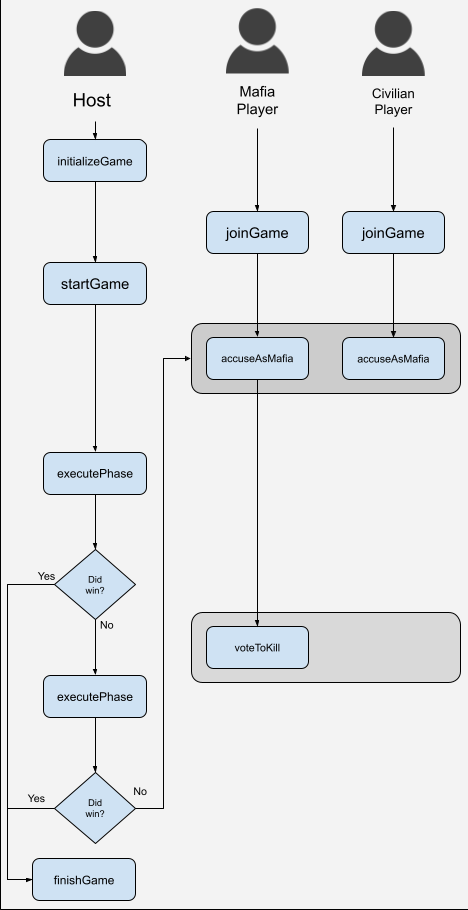This project defines a contract that can be used to play games of Mafia on an EVM blockchain.
This is currently deployed to:
- Base Goerli: 0x25ba57bb0371488E794EE631533609D3eC1F92c4
Mafia is a game of social deception. Players are divided into two factions:
- Civilians: their objective is to identify and convict all Mafia members
- Mafia: their objective is to kill civilians
The Mafia know who is Mafia and Civilians, but the Civilians do not know which faction other players belong to. It is up to the Civilians to successfully cooperate together to find the Mafia members among them before it is too late.
Each round of the game is divided into two phases: a day phase and a night phase. During the day, all players submit votes to who they think is Mafia; whoever has the most votes is expelled from the game, having been convicted by popular vote. After this, the round transitions to night, where the Mafia players will work together to determine who they wish to kill.
Victory is achieved through the following conditions:
- Mafia wins if the number of civilians left after the day phase or night phase is less than or equal to the number of living, non-convicted Mafia members.
- This is because, if there is an equal number of Mafia and Civilians, then the Mafia can, presumably, deadlock the Mafia accusations until they kill all of the remaining Civilians.
- Civilians win if all of the Mafia members have been successfully voted for and convicted of being Mafia.
- A minimum of three players is required.
- Mafia players cannot kill other Mafia players.
- Players who have been killed or convicted of being Mafia can no longer participating in the game.
This diagram shows the flow of function calls in the contract needed to run a game of Mafia. Note that the host user defined here can also be a player - it's only separated out to illustrate the different roles (as a player can be both Mafia and host or Civilian and host).
To run the tests, execute:
npx hardhat test
You can get gas estimates with the tests by running:
REPORT_GAS=true npx hardhat test
To run the contract locally on a Hardhat node, create a local .env file and populate it as:
WALLET_KEY=<your dev wallet's private key; multiple support with comma delimitation>
Then un-comment the commented-out block in hardhat.config.js (as it, otherwise, interferes with running tests). After that, execute the following in one terminal:
npx hardhat node
...and then deploy the contract using:
npx hardhat run scripts/deploy.js --network localhost
This project uses solhint for its linting. To lint this project, follow the installation instructions of that project and then run the following:
solhint 'contracts/**/*.sol'
At present, this project only supports deployment on the Base Goerli Testnet. Within the .env file at the root of the project, add a WALLET_KEY property with a value of the private key of the wallet you wish to use to deploy the project.
Once you have that all set up, execute:
npx hardhat compile
This will compile the contract. If that succeeds, run the following to deploy the contract to the Base Goerli testnet:
npx hardhat run scripts/deploy.js --network base-goerli
This should successfully deploy the contract to the Base Goerli testnet.
